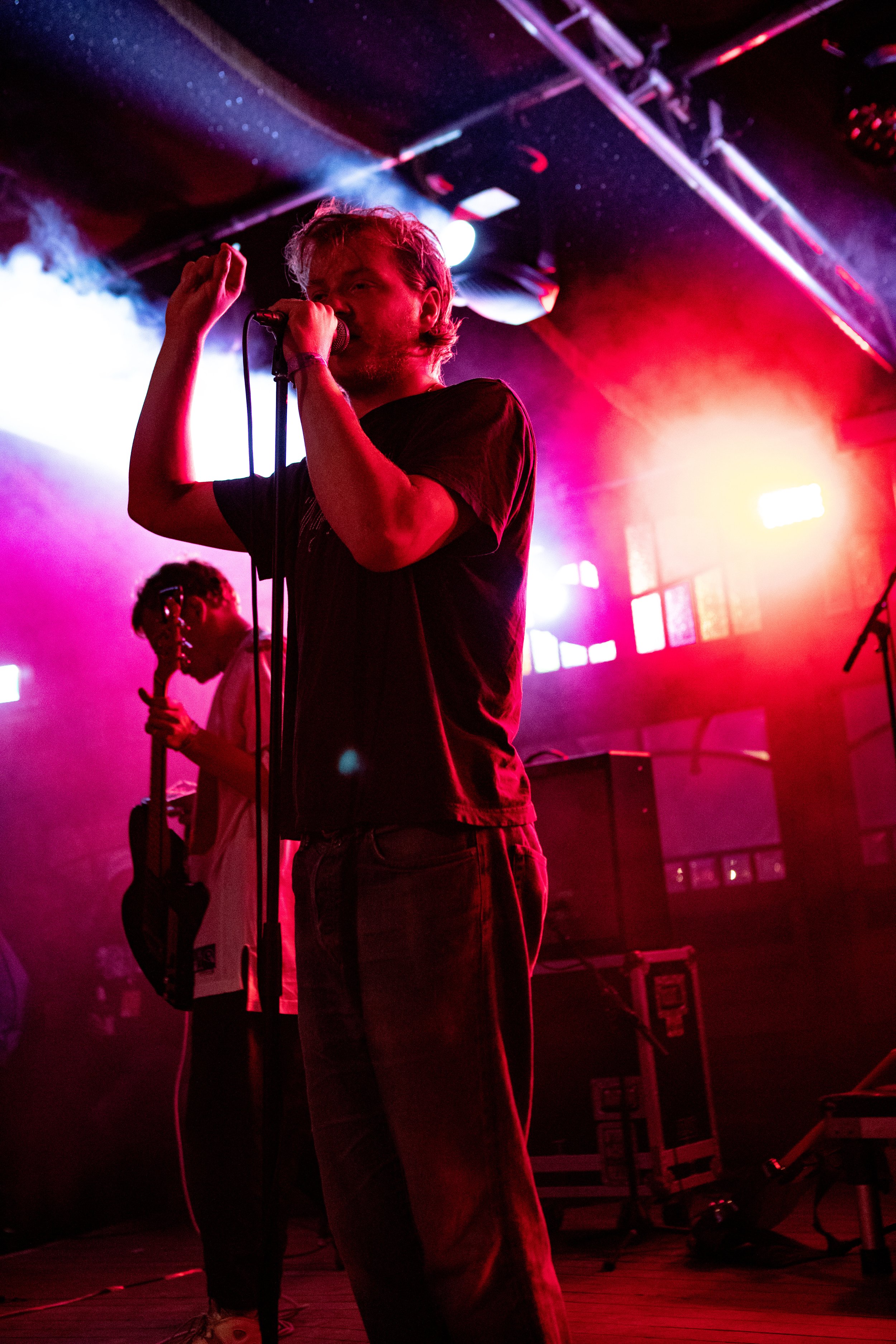frame 59 August 2024
An Interview with Jack Merrett
Cy Worthington
Jack Merrett is the lead singer and songwriter of Famous, a London-based band whose debut album Party Album will be released on 11 October on untitled (recs). They will embark on a UK tour in December.
Here Jack is interviewed by Cy Worthington.
Photograph by Jack Lovekin.
CW: At one level, this album’s principal subject-matter is the journey through addiction and recovery, but it’s also about love, and perhaps about some dialectical relation between the two: addiction getting in the way of love, love being a catalyst for overcoming addiction. Some form of resolution seems to be found in the final song, ‘Love Will Find a Way’, which is very affectionate, almost penitential. I wonder whether there was any intention behind that structure?
JM: The sense that the album has a resolution is one I don’t have intuitively because the order of the songs was arrived at very late in the process. How you start and finish something has quite a bearing on what someone might think it’s all about. Incidentally ‘Love Will Find a Way’ was one of the first songs that was written.
CW: I may be misremembering but I thought I’d heard an earlier version of that recording where the feedback noise overlaying the piano outro was much quieter than it is in the current version, making it less tonally ambiguous, and more optimistic.
JM: That’s interesting but it wasn’t intentional. Sometimes in the process of mastering certain elements that initially sit low in the mix can be brought to the surface, often in a nice way. The passage you’re referring to was actually taken from the Siegfried Idyll, a Wagner chamber piece, and rearranged by our pianist Alex Wilson. It’s, for me, one of the greatest love songs ever written. I remember reading that Wagner wrote it for his wife Cosima, and that when he first presented it to her he sat on the piano as Cosima stood on the stairs looking down at him as he played it. For some reason Nietzsche, who was devoutly in love with Cosima, was there as well, presumedly writhing in jealousy.
CW: So you’re co-opting some of that mythology in your song.
JM: Possibly. The fixation with romantic love, and the return to it as a theme, I often think about in terms of there being a certain idiom in which love is talked about in pop music, one that has both tenderness and artifice to it. I’ve always found the way in which love is performed in pop music very powerful. And as you say, the album is about a period in my life which involved a certain amount of growth and recovery from times of being not very happy, and so it has that mixture of light and dark. But while telling that story I keep returning to this manner of speaking about love, a grand, universal, almost unreal kind of love.
CW: I think that’s what I was getting at at the beginning of the interview. The feeling that the gestural romantic idealism is at cross purposes to that darkness and pain that dominates much of the lyrical landscape.
JM: I think it’s fairly true to life, or my life at least, that the tendency to romanticise and idealise runs deep, but sits alongside a reality inadequate to that ideal. This album, of all the things we’ve released, has been the hardest to pin down what it is exactly that I’m trying to say. Autobiographically that would make sense, since half of it was written when I was in quite a bad way, making an enemy of myself. When I first started to develop what I can recognise now as my lyrical voice, a huge part of that was that I found it cathartic and gratifying to be excessively honest about my own experiences, and there was a certain power in that. I’ve always been a quietly shy and introverted person that tried to push against my shyness, so it was a relief to realise there was this way I could take ownership of the narrative of my own life and put it up in grand lights. But in recent years I’ve grown more sceptical of that. It’s very easy to start living your life as if you’re trying to make an artistic point.
Photograph by Cindy-Louise.
CW: There’s also a sense, which you touched on earlier, that you’re consciously participating in a tradition of popular music which has its own kind of narrative voice and tropes.
JM: It’s a part of writing pop music which everyone understands but is rarely talked about. It’s an incredibly trope heavy medium. And the play that you can make on those tropes is where some of the most intelligent writing happens. There’s a culture and a history to it now that simply didn’t exist when many of my heroes were working, and so you’re necessarily in conversation with that tradition when writing today.
CW: I wanted to ask you about the interesting use of genre in this album. Aside from the post-punk milieu you’re coming out of, you hear shades of alternative R&B, noughties grunge, indie, industrial, synth pop, classic rock. Do you think the future of contemporary songwriting is one where genres are actively picked up and put down in this playful way?
JM: We live in a very referential moment for culture generally, and it feels as though there’s a paucity of new ideas. I guess that’s the insight of postmodernism. I don’t think that it’s necessarily a permanent state of affairs, and from a grand human historical perspective it would be incredibly naïve to assume so, but having conversations with the past for want of a conceivable future can be interesting and fun.
CW: It also feels like an homage to the music you’ve loved. You seem to enjoy that side of it.
JM: There’s a tendency in the postmodern re-appropriation of things to harbour an implicit disdain for the thing you’re referencing. In my case I have quite an earnest reverence for the artists I admire. Songwriting itself can be split into two parts in that you can break down any song of any genre to its chords, melody and lyrics. The rest is production, arrangement, and all the added stuff is what a lot of the time determines genre. There’s something extremely traditional about how I approach the first thing. The question of what I do second is less important to me because I’m so reverential about that first part of the process. Because this album was our debut I wanted all the songs to have a strong core. As I begin to write the next one I’m more open minded, some songs are led by production and some are written on the piano. You’ve got to keep yourself interested.
To listen to the first single from the album and for information on Famous’s December tour, see HERE.


